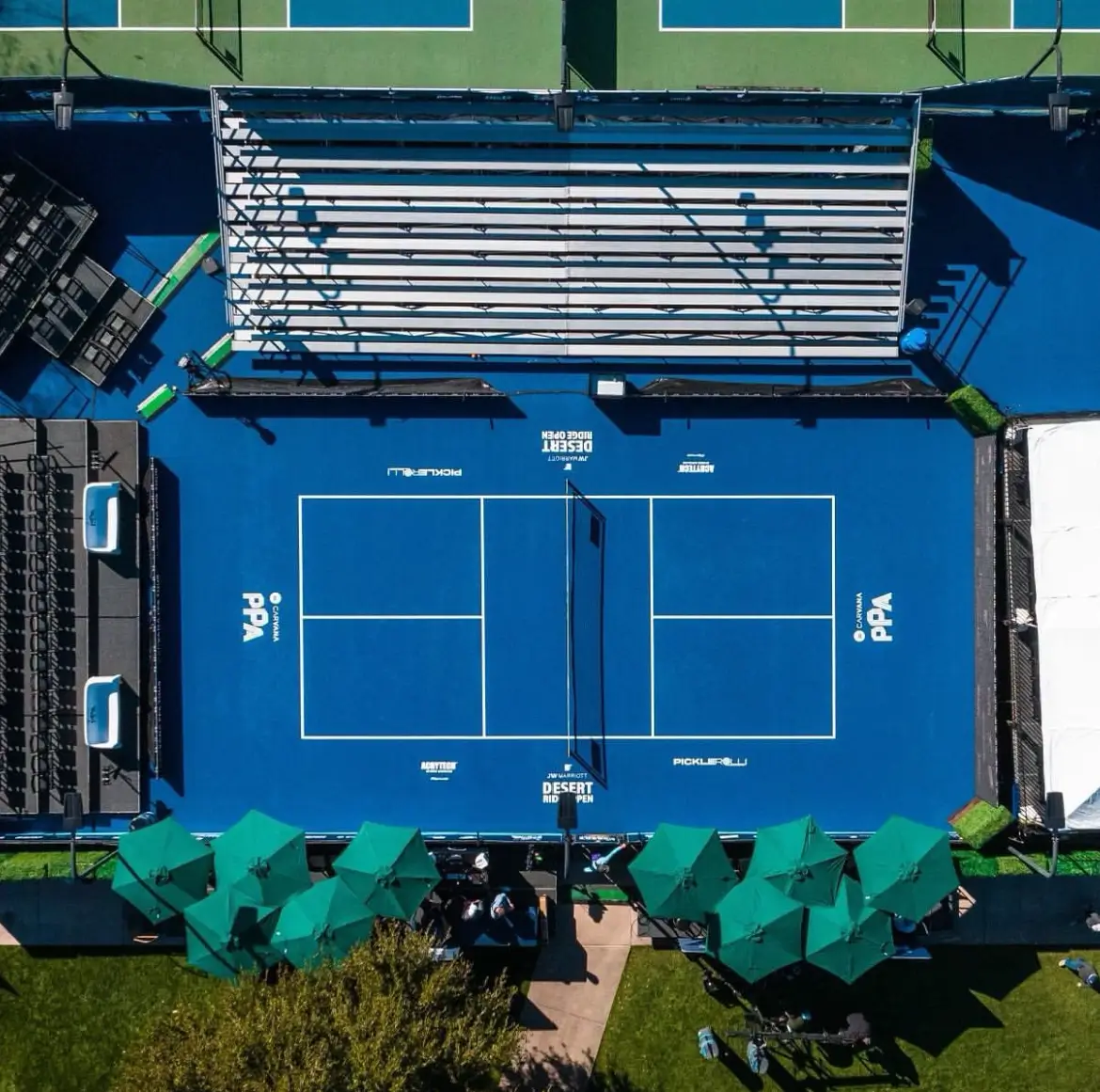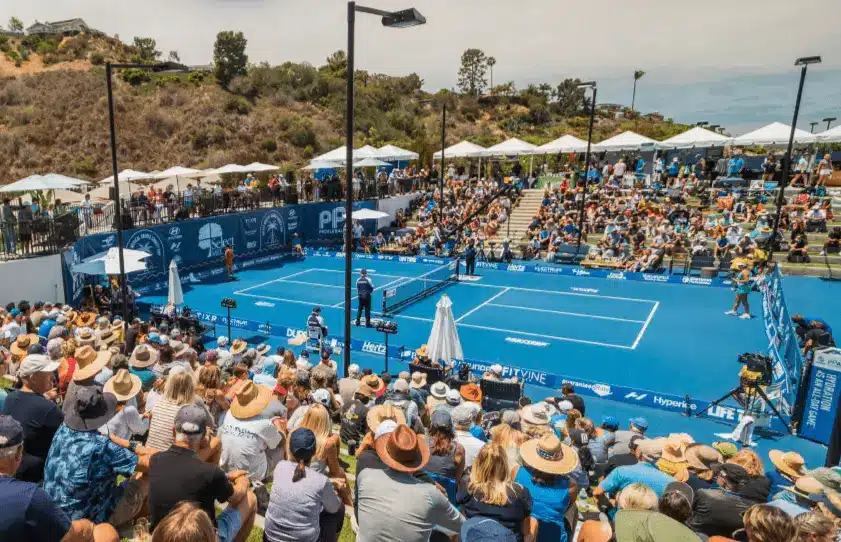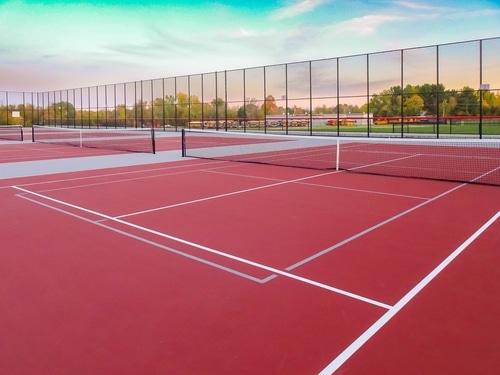Correct Pickleball Etiquette
| February 15, 2024

There’s no wrong way to enjoy pickleball, but there are several things you can do to make sure everyone else is having a good time playing, too.
Because when it comes to playing pickleball, especially in an “open play” environment, you should be mindful of others.
Pickleball etiquette is important for maintaining a positive and respectful atmosphere on the court. Take a look at a few guidelines to help you make sure everyone is having a great time.
Wait your turn
Every place has different rules, so when you show up to play, check with a regular. Figure out how the order is selected, whether you can just jump on an open court, or whether there’s a “paddle stack.” Either way, respect the rules of wherever you’re playing and wait for your turn to serve, swing, and volley.
Know the rules
No, you don’t have to be an expert and well-versed enough to become a PPA-certified referee, but when you play, especially among strangers, it’s expected in an open-play situation that you know and understand all the rules, from scoring to the non-volley zone.
In addition to knowing the rules, make sure you’re also understanding of noise – not from the paddle or the ball – but from yourself. Shouting during points, at your opponents or otherwise is considered bad sportsmanship. Make sure you’re not being a distraction to other players.
Mind your space
Obviously, you want to stay within your designated playing area and avoid encroaching on neighboring courts. Give players on adjacent courts enough space, too, but more importantly, recognize the type of game you’re playing. If you’re an experienced player, now is not the time to “stack” the court, take a majority of the shots, and try to “shake and bake.”
Everyone is there for different reasons, so if you decide you’re going to take all the middle shots, all the drives, and all the drops on both sides of the court, realize you may be taking away someone else’s fun. Not everyone out on every court during open play is there to work toward winning their next tournament. Some are out for exercise. Others are out to laugh and hit a few shots. Just be aware that what you want isn’t necessarily what others want.
Be a good sport
It’s customary to tap paddles with your opponents and teammates before and after a game as a sign of good sportsmanship. Just because Riley Newman and Lea Jansen on the PPA Tour don’t like to tap paddles between games, doesn’t mean it’s appropriate for you to do. Be a good sport and others will be a good sport toward you.
It’s in, don’t worry about it
Be honest and fair with line calls. If you’re unsure, give the benefit of the doubt to your opponent, and even if it’s close, go ahead and give your opponents a wide berth. Remember, you’re likely playing with strangers and in a recreational setting, so there’s no reason to do anything but make sure you give lots of grace.
And the good thing is, when you give grace, it likely comes back to you. Just watch. If you err on the side of opponents, they will give you a few close calls, too.
If you happen to come across a player who continuously or is egregious in making bad calls, the best approach might be to just let it go. Does it truly matter in the long run? Probably not. And it’s certainly not worth getting into an argument about it.
You can certainly call “Kitchen” faults, service faults, or a hindrance on another player. It probably won’t go over very well at all. The best course of action is to play by the rules but be lenient in enforcing them.
Read the room
This is a tougher situation, but it’s a crucial one. Check your surroundings and understand who’s on the court with you.
If you happen to see a few people who are beginners, it’s probably best not to smash the ball at them. If you see some people who maybe don’t move too fast, it’s probably best not to work on your lob game.
Just try to be aware. Remember, even the most skilled players recognize that they can work on their game against even the newest of newbies. If you’re one of those experienced players, take the time to work on your dinks and drops. Maybe save your forehand drives for another time.
Conversely, if you’re a newer player or maybe someone who doesn’t understand every nuance to the game, don’t just assume the experienced players want to spend their entire session with you. Be kind and understanding to those who are more experienced. They’ll be likely to help you and help your game improve.
Retrieve balls promptly
This one is easy. If a ball comes onto your court, gather it quickly and get it back to the correct player. Don’t just smash it back to the other court without looking. Do a quick glance, look to see who’s calling for the ball, and help out.
Also, if your ball rolls onto another court, be courteous. Thank them for returning the ball to you promptly.
No one wants to hear it
Unsolicited advice is the worst kind of advice. Avoid coaching those who don’t want coaching.
Naturally, if someone is new, asks questions or needs help, definitely offer it. However, suggesting to someone how to hit a shot, what shot to hit, or pointing out when someone messes up or does something unconventional, is considered poor form.
Don’t offer any advice to anyone unless they ask for it.
Hit to the better player
Don’t pick on the weaker player during a recreational game. Focus your time and effort on trying to have fun. Others are trying to have fun, too, which means spreading the ball around, hitting to both players is always appreciated. No one wants to feel “targeted,” plus when you hit the ball to a better player, you’ll get better in return, because the better player will return the ball in a tougher manner. Everyone wins this way.
What’s the score?
Make sure you say the score before you serve. Not only does this get everyone on the same page, but it also alerts the returner of serve that the ball is about ready to be put into play.
Be a good teammate
No one wants a teammate who sighs and gets down every time you miss a shot, so don’t do that to your partner. Be uplifting. This is especially encouraging for newer players who probably feel anxious and pressured to perform well in a game.
Respect the court
If there are time restrictions for court usage, be mindful of them and finish your game within the allotted time.
Remember, everyone wants to play and have a good time. You can definitely make someone’s experience better.
(Now that you have learned about pickleball etiquette, take a look at how to play pickleball)





